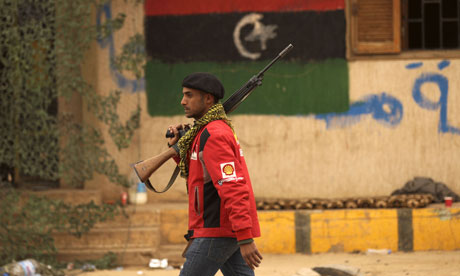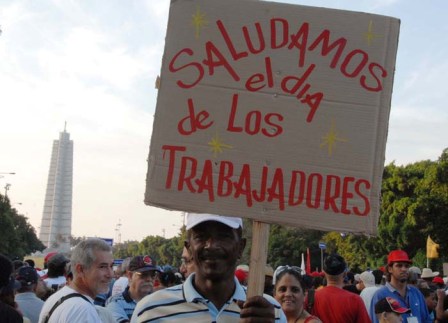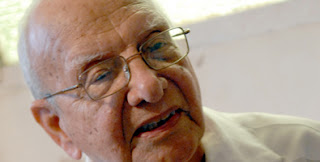Want to know what a sustainable climate-change-proof agricultural system might look like? Here’s an example from Cuba, in an academic paper written by my friend, comrade and former boss, Peter Rosset, together with folk from Cuba’s peasant agriculture movement. The article’s free to download (for now), but the key parts from the abstract are:
Our key findings are (i) the spread of agroecology was rapid and successful largely due to the social process methodology and social movement dynamics, (ii) farming practices evolved over time and contributed to significantly increased relative and absolute production by the peasant sector, and (iii) those practices resulted in additional benefits including resilience to climate change.
Cuba

A Libyan rebel walks past a military position decorated with the rebellion flag at the souther
Australia: How Socialist Alternative misrepresents Socialist Alliance on Libya

February 22, 2011 -- Solidarity rally in Sydney with the
Libyan people in their struggle for democracy. Photo by Pip Hinman. See an article
about this action here: http://www.greenleft.org.a
[For more coverage of Libya, click HERE.]
By Nick Fredman
March 16, 2011 -- Links International Journal of Socialist Renewal -- Most interested observers of the public statements and activity of the Australian organisations Socialist Alternative (SAlt) and Socialist Alliance in regard to Libya would surely conclude that the two groups are in concord: a similar analysis of the pro-imperialist nature of the regime and enthusiastic support for the struggle of the workers and oppressed against dictatorship. Which makes it quite disappointing that Corey Oakley of SAlt has launched a swingeing polemic against Socialist Alliance about Libya[1]. [See Appendix 1 below]
Immanuel Wallerstein: Libya and the world left

By Immanuel Wallerstein
March 15, 2011 -- There is so much hypocrisy and so much confused analysis about what is going on in Libya that one hardly knows where to begin. The most neglected aspect of the situation is the deep division in the world left. Several left Latin American states, and most notably Venezuela, are fulsome in their support of Colonel Gaddafi. But the spokespersons of the world left in the Middle East, Asia, Africa, Europe and indeed North America, decidedly don’t agree.
Hugo Chavez’s analysis seems to focus primarily, indeed exclusively, on the fact that the United States and western Europe have been issuing threats and condemnations of the Gaddafi regime. Gaddafi, Chavez and some others insist that the Western world wishes to invade Libya and “steal” Libya’s oil. The whole analysis misses entirely what has been happening, and reflects badly on Chavez’s judgment – and indeed on his reputation with the rest of the world left.
Fidel Castro: The revolutionary rebellion in Egypt

By Fidel Castro Ruz
Cuba: El sindicato Australian Workers Union se arrodilla ante Washington

[English at http://links.org.au/node/2122.]
Por Tim Anderson
En este mes de enero, el Sindicato de Trabajadores Australianos (AWU—Australian Workers Union) escribió una carta insultante al nuevo embajador cubano en Australia, Pedro Monzón. El documento del sindicato revela la dominación ideológica que Estados Unidos mantiene sobre las partes más débiles y dóciles del movimiento sindical australiano.
El embajador Monzón, llegado a Australia a finales de 2010, invitó a varios dirigentes sindicales para un intercambio. Paul Howes, como Secretario Nacional del AWU, le replicó de manera innecesariamente ofensiva: ‘Estaría encantado de aceptar su oferta de encuentro, pero, desafortunadamente, sólo podrá llevarse a cabo cuando el gobierno cubano cese la represión de los sindicatos independientes y libere los numerosos dirigentes sindicales actualmente encarcelados en su país.’ En la carta se menciona a cinco encarcelados.
Fidel Castro: Mubarak's fate is sealed

By Fidel Castro
February 1, 2011 -- Egyptian President Hosni Mubarak’s fate is sealed, not even the support of the United States will be able to save his government.
The people of Egypt are an intelligent people with a glorious history who left their mark on civilisation. “From the top of these pyramids, 40 centuries of history are looking down upon us”, Napoleon Bonaparte once said in a moment of exaltation when the revolution brought him to this extraordinary crossroads of civilisations.
After World War II, Egypt was under the brilliant governance of Abdel Nasser, who together with Jawaharlal Nehru, heir of Mahatma Gandhi; Ghana's Kwame Nkrumah; and Guniea's Ahmed Sekou Toure — African leaders who together with Sukarno, then president of the recently liberated Indonesia — created the Non-Aligned Movement of Countries and advanced the struggle for independence in the former colonies.
Cuba: Australian Workers Union tips its hat to Washington

More than a million Cuban workers mobilise each year on May Day, organised by the Central de Trabajadores de Cuba trade union federation.
[See also "Cuban trade unionist: `Workers are key participants in the Cuban revolution'".]
By Tim Anderson
January 26, 2011 -- This January the Australian Workers Union (AWU) wrote an insulting letter to the new Cuban ambassador to Australia, Pedro Monzón. The union’s response shows the tight ideological hold that the US has over the weaker, more compliant sections of the trade union movement in Australia.

The following article was recommended by Raj Patel. Patel writes:
Camila Piñeiro Harnecker: `Cuba needs changes, to take us forward rather than backwards'

Cuban workers march on May Day 2009. Photo by Bill Hackwell/Havana Times.
How the Communist Party of Australia exposes the Democratic Socialist Party's 'Trotskyism'
By Doug Lorimer
[This article first appeared in the Democratic Socialist Party's internal discussion bulletin, The Activist, volume 10, number 7, August 2000.]
The Communist Party of Australia has recently published a pamphlet by David Matters entitled Putting Lenin's Clothes on Trotskyism which claims that the DSP's rejection of Trotsky's theory of permanent revolution is really a cover for its support for Trotskyism. However, the real purpose of the pamphlet is to criticise the DSP's position on the 1998 waterfront dispute.
This is made clear in the introduction to Matters' pamphlet by CPA general secretary Peter Symon:
In writing Putting Lenin's clothes on Trotskyism, David Matters has contributed to the task of clarifying ideas and maintaining the validity and truth of Marxism...
The attack on Marxism in the name of Marx, or on Lenin in the name of Lenin, is a particularly pernicious form which can easily mislead those who are not familiar with what Marx, Engels and Lenin actually said and wrote.
The pretension that Trotsky was a great Leninist is one of these misrepresentations and was refuted time and again by Lenin.
Cuba: Economy of commands or earnings? Joaquin Infante on economic changes

